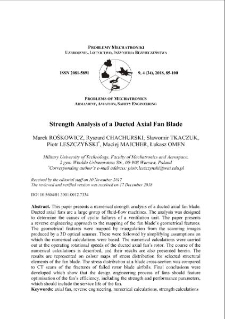Our Digital Library contains 1 868 digital objects
Object
Title: Strength Analysis of a Ducted Axial Fan Blade
Alternative title:
Analiza wytrzymałościowa łopaty osiowego wentylatora kanałowego
Contributor:
Ryszard CHACHURSKI, Sławomir TKACZUK, Piotr LESZCZYŃSKI, Maciej MAJCHER, Łukasz OMEN
Abstract:
This paper presents a numerical strength analysis of a ducted axial fan blade. Ducted axial fans are a large group of fluid-flow machines. The analysis was designed to determine the causes of cyclic failures of a ventilation unit. The paper presents a reverse engineering approach to the mapping of the fan blade’s geometrical features. The geometrical features were mapped by triangulation from the scanning images produced by a 3D optical scanner. These were followed by simplifying assumptions on which the numerical calculations were based. The numerical calculations were carried out at the operating rotational speeds of the ducted axial fan’s rotor. The course of the numerical calculations is described, and their results are also presented herein. The results are represented on colour maps of stress distribution for selected structural elements of the fan blade. The stress distribution at a blade cross-section was compared to CT scans of the fractures of failed rotor blade airfoils. Final conclusions were developed which show that the design engineering process of fans should feature optimisation of the fan’s efficiency, including the strength and performance parameters, which should include the service life of the fan.
Place of publishing:
Warszawa
Publisher:
Date created:
Date submitted:
Date issued:
Extent:
Identifier:
oai:ribes-88.man.poznan.pl:2528
Call number:
Electronic ISSN:
Print ISSN:
Language:
Rights holder:
Starting page:
Ending page:
Volume:
Keywords:
axial fan, reverse engineering, numerical calculations, strength calculations
Object collections:
Last modified:
Sep 18, 2025
In our library since:
Sep 18, 2025
Number of object content hits:
0
All available object's versions:
https://ribes-88.man.poznan.pl/publication/2836
Show description in RDF format:
Show description in OAI-PMH format:
| Edition name | Date |
|---|---|
| Strength Analysis of a Ducted Axial Fan Blade | Sep 18, 2025 |
Objects Similar
Maciej MAJCHER Stanisław WRZESIEŃ, Michał FRANT, Łukasz OMEN
Marek ROŚKOWICZ Michał JASZTAL, Mateusz KUNIKOWSKI

